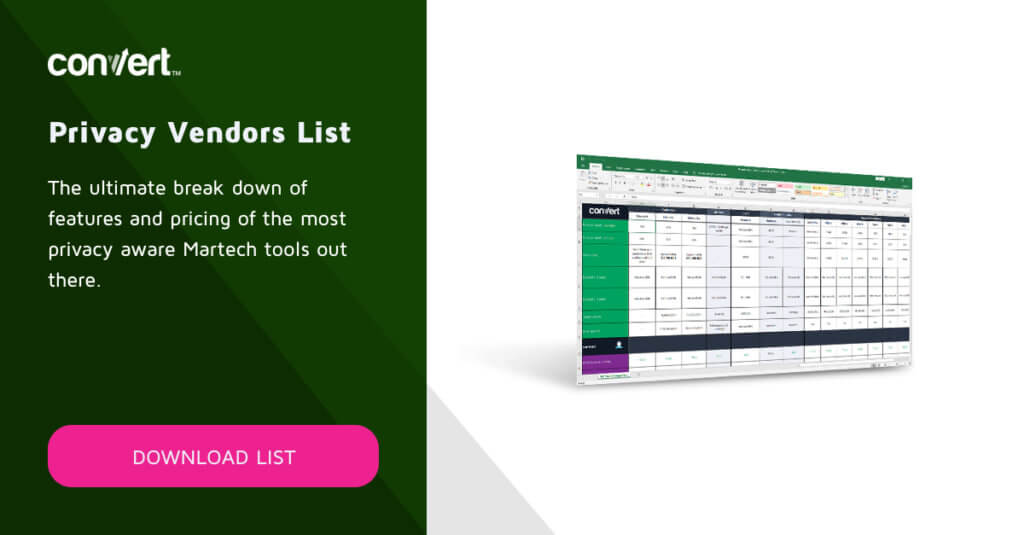Simply as entrepreneurs be taught to outlive in a post-GDPR world, the deadline for the ePrivacy Regulation — the successor to the ePrivacy Directive (also referred to as “The Cookie Regulation”) — inches nearer.
Acknowledged for a launch in 2019, the upcoming ePrivacy Regulation, like
the GDPR, is relevant to any enterprise concentrating on EU clients… Which implies just about ALL of us want
to conform!
And simply as within the prelude to the GDPR,
lawmakers and lobbyists are taking over one another with explosive costs, open
letters, and flicks hinting at how the world will develop into an app-wasteland submit
its implementation.
So what’s the ePrivacy Regulation all about?
And why do we want it once we have already got a stringent GDPR in place? And what
the heck does it imply
for entrepreneurs like us?
Let’s discover out.
“The GDPR is Not Sufficient… ”
… Says Ms. Birgit Sippel, a European
Parliamentarian and drafter of the ePrivacy Laws — and the lead negotiator for the ePrivacy Regulation.
Many different lawmakers additionally echo the identical perception
that whereas the GDPR is a robust regulation regarding knowledge safety; guaranteeing
knowledge privateness — which is the important thing premise of the ePrivacy Regulation — wants extra specifics.
Jan Philipp Albrecht, a German Parliamentarian (who was the lead
negotiator on the GDPR), places this actually properly. He explains that the GDPR units the
“world commonplace for shielding
private knowledge,” and that ePrivacy is the “lacking brick on this wall.”
The ePrivacy Regulation is, in actual fact, the “lex specialis” to the GDPR, as even the proposal states:
“This proposal is lex specialis to the GDPR and can particularise and complement it as regards digital communications knowledge that qualify as private knowledge. All issues in regards to the processing of non-public knowledge not particularly addressed by the proposal are coated by the GDPR.” — The ePrivacy Regulation proposal
Initially meant to launch on the identical day as
the GRPR, this lex specialis to the GDPR
addresses a number of particular topic issues coated by the GDPR. For entrepreneurs
like us, an important of those specifics are communications and cookies.
Let’s have a look.
Communications & Cookies Beneath the ePrivacy Regulation
The ePrivacy Regulation goals to guard knowledge confidentiality over a
wide selection of digital communications.
Initially, the ePrivacy Laws targeted primarily on the e-mail
and SMS channels. The upcoming regulation, nonetheless, expands its ambit to cowl
newer communication providers similar to WhatsApp, Fb Messenger, Skype,
Gmail, iMessage, and so on. And likewise IoT gadgets and countertop
terminals amongst others.
So in the event you ever have a consumer elevating a priority
about why they acquired a message from you on their Fb Messenger app, you’ll
have to have a look at the ePrivacy
Laws. And never the GDPR because the ePrivacy Regulation provides extra particular guidelines on communications.
Additionally, together with the precise content material of the
communications, the revised ePrivacy
Regulation can even want you to anonymize and delete any associated metadata as effectively, if the customers
haven’t consented to its use or processing.
“Each content material and metadata will should be anonymised or deleted if customers haven’t given their consent, except the information is required as an illustration for billing functions.” — The Presentation of the ePrivacy Regulation
Apart from guaranteeing communications’
confidentiality, the upcoming ePrivacy
Regulation additionally targets how corporations use cookies to gather and monitor knowledge for
behavioral evaluation. It wants you to hunt specific consent out of your customers
earlier than putting in any cookies on their browsers.
So as an illustration, in the event you run experiments in your web site or provide personalised internet experiences, then you definitely’re going to want some cookies. However with the ePrivacy Regulation in place, you’ll have to clarify the cookies you utilize and search specific consent earlier than putting in them in your customers’ browser.
As you
can think about, this can lead to lots of consent fatigue.
The answer?
Selecting non-intrusive and privacy-friendly advertising options.
At Convert Experiences,
as an illustration, the place we construct one of the crucial privacy-friendly A/B testing
software program, we solely use first-party efficiency cookies that don’t gather any
personally identifiable details about web site guests.
All the knowledge our cookies gather is
aggregated and nameless.
The ePrivacy Regulation doesn’t even want you to hunt specific
consent for utilizing such cookies in your customers’ browsers (as these cookies could be
listed and defined in your Privateness Coverage).
With such advertising options, you don’t simply go within the course of compliance, you additionally provide a greater product expertise to your customers by eliminating consent fatigue.
Embracing Privateness by Design and Default
If there’s one factor the GDPR and the upcoming ePrivacy Regulation need from any enterprise that collects, processes, makes use of, and manages knowledge over any communication channel, then it’s this:
Privateness by design and privateness by default.
To make this attainable, Sippel asks companies
to assist customers make knowledgeable selections about their knowledge and privateness, even when
they aren’t tech-savvy.
So whether or not it’s operating your advertising
campaigns or selecting your advertising tech stack, sticking to non-privacy
intrusive means will work the perfect. You also needs to help these with specific
consent varieties utilizing the best attainable explanations concerning the knowledge you’re
amassing or the consent you’re searching for.
Positive, complying with the ePrivacy Regulation will want work, however in the event you’re GDPR-compliant already — which try to be — you may have a substantial head begin.
Cell studying?
Initially revealed June 10, 2019 – Up to date December 15, 2021






